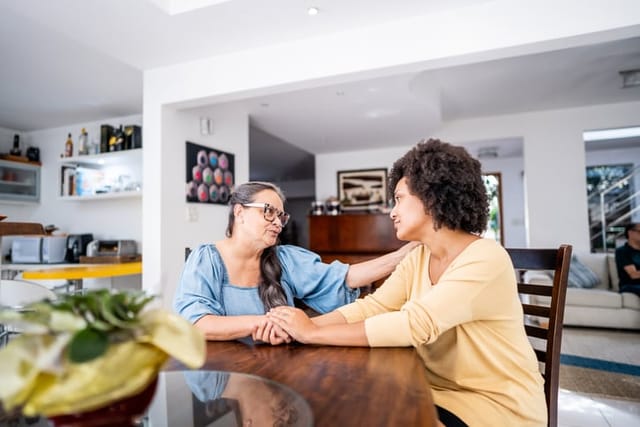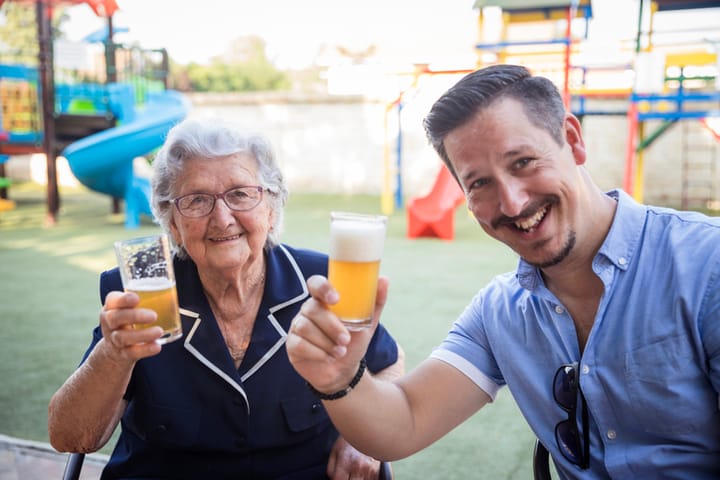Toxic relationships aren’t just romantic in nature. In fact, many people sadly know all too well that friends and even family members can be harmful presences in our lives. However, you’ve probably never considered the idea of toxic grandparents and what that might look like. The fact is that they do exist, and the effects they can have on us can be just as devastating. Here’s what you need to know.
1. This dynamic is more common than you think.

When we think of grandparents, we tend to imagine adorable older people who spoil their grandkids and are super loving and supportive. However, that’s not always the case. In fact, dysfunctional relationships with our parents’ parents are pretty common. It’s just that we’re not often trained to recognize the signs. “This type of relationship is more common than people may think, as it often stems from unresolved issues between the grandparent and parent,” licensed clinical social worker Steve Carleton, LCSW, CACIII, explains to Bolde. “Maybe they’ve never seen eye-to-eye, or the grandparent holds onto a particular set of beliefs and values that the parent has rejected. It can also arise from a grandparent’s inability to accept the differences between generations.
2. They’re emotionally manipulative.

Toxic grandparents may use emotional manipulation to control their grandchildren, such as guilt-tripping them. They might try and make their grandkids feel bad for them by painting themselves as helpless or neglected. In reality, they’re trying to elicit sympathy to get their way.
3. They’re overly critical and judgmental.

They may constantly criticize and judge their grandchildren, making them feel inadequate and insecure. Nothing the grandchildren do is right, from their choice of career, partner, clothes, etc. Toxic grandparents rarely have a kind word for their grandkids’ decisions.
4. They don’t respect boundaries.

Toxic grandparents act as if your boundaries don’t exist. They have no issue with invading their grandkids’ privacy or disregarding their wishes. They believe they should have access to whatever they want, whenever they want. It doesn’t matter how the grandkids feel about it.
5. Their behavior is inconsistent.

They may be inconsistent in their behavior and attitude towards their grandchildren, making it difficult for the grandchildren to know what to expect from them. One day they’re super sweet and laid-back, but the next day they’re rude and insulting. As a result, it’s hard to know where you stand with them.
6. They refuse to take responsibility for their actions.

Toxic grandparents may refuse to take responsibility for their actions and blame others, including their grandchildren, for their problems. Despite being on this earth for many years, they still haven’t learned accountability.
7. They’re verbally or physically abusive.

In extreme cases, toxic grandparents may be verbally or physically abusive towards their grandchildren, causing emotional trauma and long-lasting damage. Needless to say, this is not okay.
8. They show favoritism.

Toxic grandparents may show favoritism towards one or some of their grandchildren, often causing jealousy and resentment among siblings or cousins. Oftentimes, they don’t even try to hide this. In fact, they may use it as a way to manipulate the non-favorites.
9. They undermine the parents.

What the parents say should be what goes, but toxic grandparents have no issues going against the parents’ rules or decisions, which can create confusion and conflict for the grandchildren.
10. They enable bad behavior.

Toxic grandparents may enable and even encourage bad behavior in their grandchildren, such as spoiling them excessively or condoning inappropriate behavior. They may think it’s no big deal, but that’s because they’re not the ones who have to deal with the kids most of the time.
11. They’re neglectful.

They may neglect their grandchildren’s needs, both emotional and physical, by not showing interest in their lives or failing to provide adequate care. While grandparents aren’t parents, they should still be an active and supportive presence in their grandchildren’s lives.
12. They interfere in family dynamics.
Yes, they should be considered in decisions that affect them. However, toxic grandparents love inserting themselves in other people’s drama, causing tension between family members or creating a rift in relationships.
13. How to navigate a relationship with toxic grandparents

If you recognize the signs that your grandparents might be toxic (or at least engaging in toxic behaviors), it’s important to take action to change the dynamic. That being said, there’s no one way to handle the problem. Carleton recommends setting boundaries as a first step to protecting yourself. “If, for example, you’re not comfortable with the grandparent criticizing you or belittling your beliefs, then make it known to them that this behavior is unacceptable. While it may not be easy to do, it’s important to assert yourself and make sure that your boundaries are respected,” Carleton says.
14. Try shifting your dynamics.
Reframing your relationship and shifting the dynamics can also be helpful. This way, you respect each other mutually instead of fighting against one another. “Instead of engaging in arguments, strive to understand each other’s perspectives and show genuine concern for their wellbeing. Try finding common interests and activities to do together, such as cooking, playing games, or going for walks. Having these shared experiences can help to build a healthy and positive relationship,” he suggests.
15. Self-care is key.
While you might be successful in changing some of your grandparents’ problematic behaviors, it’s unlikely they’ll ever turn into entirely different people. “Don’t let them drag you down or make you feel bad about yourself,” Carleton adds. “Instead, focus your energy on positive things that make you happy and surround yourself with people who will uplift and support you.”






